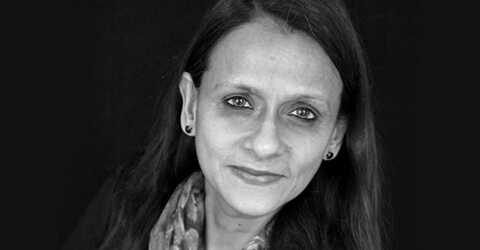Smita Tharoor is the Founder of Tharoor Associates, a training, coaching, and organisational development company that understands the importance of Unconscious Bias. She is a Thought Leader on Unconscious Bias, Keynote Speaker, Trainer and Coach who understands the importance of stories – both personal and corporate- and their role in defining an organization’s identity and practices. She was the recipient of the “Global Diversity Leadership” Award at the 2017 World HRD Congress.
Tharoor was born in India and grew up in several cities, including Bombay, Calcutta and Delhi, although she has her roots in rural Kerala. Tharoor said in her famous podcast, titled, Stories of Unconscious Bias, “We take our upbringing for granted and it was only with the benefit of hindsight I realised how lucky I was. Growing up in pluralistic India taught me the value of tolerance and the appreciation of accepting differences.”
She pursued her Bachelor’s in English and Psychology from the University of Rajasthan. She then moved to London after her undergraduate degree in the ’80s with a firm sense of her own identity and a belief that the world is an accepting inclusive place. It was only through sharing stories that she realised that she genuinely had an accepting, liberal, non-judgemental, secular upbringing. She considered herself lucky as “There was very little in my backpack that was influencing me unconsciously. I was very fortuitous.”
When she first arrived in London, she began working as an Area Personnel and Training Officer at Granada Leisure. She moved through various positions like Adult Education Teacher, Recruitment & Training Officer, Management and Leadership Consultant before finding her true passion and simplistically redefining the Unconscious Bias.
Tharoor reveals her journey to the Position of Founder of Tharoor Associates today; she said, “I fell into a learning and development job and quickly realised that employees cannot learn and change without some level of self-reflection. Understanding our own Unconscious Biases is key. We are defined by our narrative, our personal story, our experiences. These have an impact on how we make judgements and form opinions. Often, that’s just fine, but every once in a while, we make snap conclusions that have a negative outcome either for the other person or ourselves. Just one particular experience can lead to a lifelong belief.”
She felt it was purely by luck that she chanced upon the path of entrepreneurship. She recalled the incident that led her on this part, “My boss at the time told me he was retiring and would mentor me so that when the time came, I could apply for his job. That was an epiphany. Rather than being thrilled, I realised I didn’t want his job. Coincidentally, a friend of a friend was owning a company that was failing. He knew of my expertise in cultural & behavioural change and organisational development. He offered me the project and there was no looking back.”
Since the inception of her company, Tharoor Associates, in 2009, she has heard and shared some beautiful stories from incredible people across the globe. These stories were all shared in the context of better understanding our Unconscious Bias. She recalled as she heard every story shared by her recipient, “As I heard them, I realised that other than some obvious cultural differences, we all have very similar experiences.” She was so overwhelmed by these stories that she wanted to share them with a broader audience, so she decided to start a podcast series.
The revelation struck about the podcast series when in April 2020, at the peak of being locked down in Delhi, she read an interview with Vidya Balan. She talked about lockdown and lessons learned and, in the interview, she said she hated cooking because she always felt that cooking was demeaning and not part of being a successful woman, said Tharoor in an interview with The Telegraph.
She did not know Vidya Balan; she had never even met her before. However, that statement hit a note and got her thinking about why she had felt that way; what was in the upbringing that had influenced her. She had unconsciously believed this and had fought to go into the kitchen all her life. During the lockdown, she realised that she could cook if she wanted, and in fact, it did not demean her, she recalled.
That led to the critically-acclaimed actor of films such as Kahaani becoming the launch episode of Season 1 of the brilliant podcast series, Stories Of Unconscious Bias. Since then, there has been no looking back for Tharoor, with 28 interviews spread across various industries and different parts of the world.
Ultimately Tharoor feels, “To begin a real process of change, we have to look at our own Unconscious Bias and move away from these potentially damaging patterns of behaviour. Assumptions are internal; we carry them around like a backpack on our back. Before any change can be made in any relationship, we need to look into our backpacks.”







